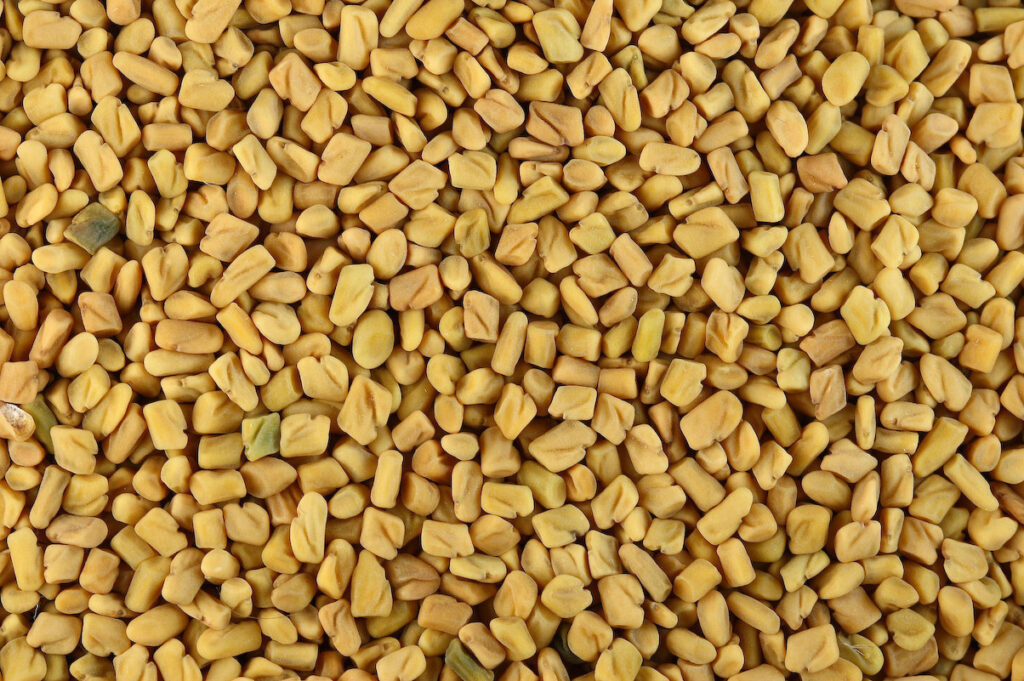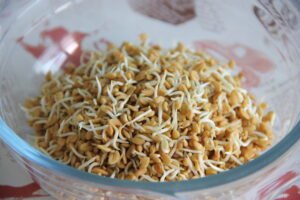
http://Sanjay Acharya, CC BY-SA 3.0, via Wikimedia Commons
Methi or Fenugreek?
Methi or fenugreek useful for diabetes are indigenous to southern Europe and Asia. It is an annual herb with yellow-brown seeds and white blooms. The leaves and seeds have a pleasant flavor and a powerful scent. Green-colored methi or fenugreek leaves are used in a variety of veggies.
The very tiny fenugreek seeds are grown in vast quantities in India. It is a member of the fabaceae family. It is a very popular Indian spice that is used to flavor and provide aroma to a variety of meals. The seeds taste bitter, however roasting them can make them less harsh.
Different names for the seed exist in different parts of the nation. The world’s biggest producer of fenugreek, or methi, seeds is India. Despite its diminutive size, the seed offers countless advantages. It has been utilized for many years as a natural medicine and cure for various health issues. The seeds of methi or fenugreek are rich in vitamins, including A, B, and C as well as folic acid. The usual uses are the leaves and seeds, but it can also be found as sun-dried leaves, called kasuri methi, and as roasted and ground seed powder.
What is the difference between methi (fenugreek), kasoori methi.
The term “methi” (fenugreek) describes the plant’s seeds. These tiny, yellow-brown seeds have a nutty, slightly bitter flavor. Dried fenugreek leaves, which have a more potent and robust flavor than the seeds, are used to make kasoori methi.
Benefits of Methi or Fenugreek for Health
Trigonella foenum-graecum, the technical name for fenugreek, is a herb that has been used for generations to cure a variety of illnesses, including diabetes, in traditional Chinese and Ayurvedic medicine. The potential health benefits of fenugreek, particularly for those with diabetes, can be attributed to its rich content of fiber, vitamins, minerals, and phytochemicals.
Regulation of Blood Sugar
Soluble fiber included in fenugreek or methi seeds has the potential to reduce the pace at which sugar and carbs are absorbed in the digestive system. After meals, blood sugar levels may stabilize as a result of this.
Increases Sensitivity to Insulin
According to a few studies, fenugreek or methi seeds may improve insulin sensitivity, which would facilitate the body’s efficient use of insulin. Those who have type 2 diabetes may benefit most from this.
Lower After-Meal Spikes
When taken with meals, fenugreek has been demonstrated to lessen blood glucose rises after meals. Its fiber content and bioactive ingredients like galactomannan could be the cause of this effect.
Manage Your HbA1c Levels
Consuming fenugreek or methi seeds for an extended period of time may result in decreased HbA1c values, which represent average blood sugar levels over several months.
Impact of Antioxidants
Large amounts of antioxidants found in fenugreek seeds can protect cells from oxidative stress, which is frequently increased in diabetics.
Control Your Weight
Fenugreek could help with controlling weight. One of the main risk factors for type 2 diabetes is obesity. According to studies, fenugreek may aid in reducing calorie intake and controlling hunger.
Methi or Fenugreek Seeds Help Lower Cholesterol
The seed’s saponins lower the amount of cholesterol absorbed from fattening meals. Additionally, it lessens the body’s excess manufacturing of cholesterol.
Boost Performance and Sexual Drive
Fenugreek seed extract has been shown in studies to enhance sexual drive in both younger and older men and women. However preliminary studies suggest that fenugreek seed oil drops may aid in boosting sperm count.
Enhance Digestion
Fenugreek seed helps the body digest food properly by relieving indigestion and constipation.
Treats Acidity
The mucilage found in fenugreek or methi seeds aids in the treatment of acidity issues.
Maintains Blood Pressure
Fenugreek or methi seeds have a high potassium content. Through the neutralization of sodium’s effects, it aids in the regulation of blood pressure and heart rate in the body.
Good Source of Phytochemicals
Fenugreek or methi seeds have effective therapeutic qualities because of their high phytochemical content. It contains a variety of phytochemicals, including tigogenin, diosgenin, and neotigogens.
Lessens Delivery Pain
By promoting uterine contraction and expansion, the seed facilitates an uncomplicated birth.
Treats Skin Issues
Fenugreek or methi seeds are useful in treating skin issues such as burns and scarring. Shiny, vividly glowing skin is one of its benefits. Other skin issues including edema, muscle soreness, ulcers, etc. are also treated by it.

Other significant advantages and applications of methi or fenugreek seeds include:
o The methi or fenugreek seed is used as a preservative in pickles because it contains vitamin E.
o Methi or fenugreek leaves are added to meat, seafood, and other meals as a flavoring.
o If added to tea, methi or fenugreek seeds can also be used as a fever remedy.
o Regular use of paste prepared from fresh methi or fenugreek leaves enhances hair health, promotes hair growth, and lessens dandruff.
Tips for Including Fenugreek or Methi seeds in Your Diet
Due to its bitter flavor, fenugreek is difficult for many people to take on a daily basis. To reap the rewards of fenugreek in cultivating a healthy lifestyle, there are various methods to incorporate this plant into the diet.
- Water with Fenugreek or Methi seeds
The simplest method to begin fenugreek consumption is this one. A glass of water and a teaspoon of fenugreek seeds should be soaked overnight. After straining the water, consume it without food first thing in the morning.
- Sprouts of Fenugreek
Fenugreek seeds are highly nutritious and grow readily. Soak the seeds in water for a whole night. After a day, take out the water and tie the seeds in a moist cotton cloth. After hanging the bundle, let it a day or two to settle. Little sprouts will appear. Eat a tiny amount of these sprouts each day. Fenugreek should be soaked in tiny amounts to avoid spoiling the sprouts.
- Leaves of Fenugreek or Methi
Many Indian cuisines, including parathas, dal, curries, rice, chutney, etc., are made with the leaves. Microgreens can be grown in tiny quantities and added to salads. Kasuri methi is the name given to the dried fenugreek leaves. These can be added to various cuisines after being gently crushed.
4.Powdered Fenugreek Seed
At home, make the powder by finely grinding and gently roasting fenugreek seeds without using any oil. Small amounts of the powder can be added to a variety of foods. In addition to improving flavor, this lowers blood sugar.

Precautions and Side Effects:
Those who have diabetes may benefit from fenugreek in a number of ways, but it’s important to be aware of any potential risks.
Hypoglycemia:
Methi has the ability to reduce blood sugar levels, which may result in hypoglycemia. When using fenugreek, anyone taking insulin or diabetes treatments should regularly monitor their blood sugar levels and speak with a healthcare provider.
Digestive Problems:
When using fenugreek or methi seeds or supplements, some people may have digestive problems like flatulence or diarrhea. To determine your tolerance, start with a modest dose and progressively increase intake.
Allergies:
Fenugreek may occasionally result in allergic reactions that include skin rashes or breathing difficulties. You may be more vulnerable to fenugreek allergies if you have a legume allergy (such as an allergy to peanuts or soybeans).
Pregnancy and Breastfeeding:
Because fenugreek may alter hormone levels, women who are pregnant or nursing should use it with caution. Before using, speak with a healthcare professional.
Overuse:
Moderation is the key with herbal remedies, as always. Adverse effects could result from fenugreek use in excess.
Conclusion
One of the finest herbal remedies for diabetes is fenugreek or methi, which is also beneficial for other conditions like obesity, constipation, and inflammation. Even though fenugreek by itself is insufficient to manage diabetes, including it in one’s regular diet has numerous advantages.
In conclusion, methi is very helpful and, when taken in moderation and according to a doctor’s prescription, can lower blood sugar levels to help control diabetes.
Frequently Asked Questions:
Can methi water control diabetes?
Most Indian cooks methi seeds, sometimes referred to as methi dana, to give their food a distinct flavor. However, these tiny seeds also offer a host of health advantages. Several studies have demonstrated that because of their capacity to reduce blood sugar, they aid in the management of type-2 diabetes. Similarly, methi water also do same function.
Can We Drink Methi Water Daily?
Yes, you can drink fenugreek water on a daily basis. Regularly consuming methi water can improve heart health overall and lower LDL (bad) cholesterol levels.
Can fenugreek seeds be eaten daily?
Yes, numerous studies show that consuming fenugreek water on an empty stomach on a regular basis decreases bloating, speeds up weight reduction, and balances intestinal health. Fenugreek seeds should not be taken more than one tablespoon each day, nevertheless.
How much fenugreek should I take for diabetes?
10 grams of fenugreek seeds a day, when consumed daily for 4-6 months together, have shown to lower HbA1c and fasting blood sugar levels.
Who Cannot drink fenugreek water?
During pregnancy: Fenugreek is frequently eaten in cuisine. If used more frequently, it is probably dangerous. It may result in early contractions and birth defects in the fetus. If fenugreek is taken just before delivery, the baby might have an odd body odor.